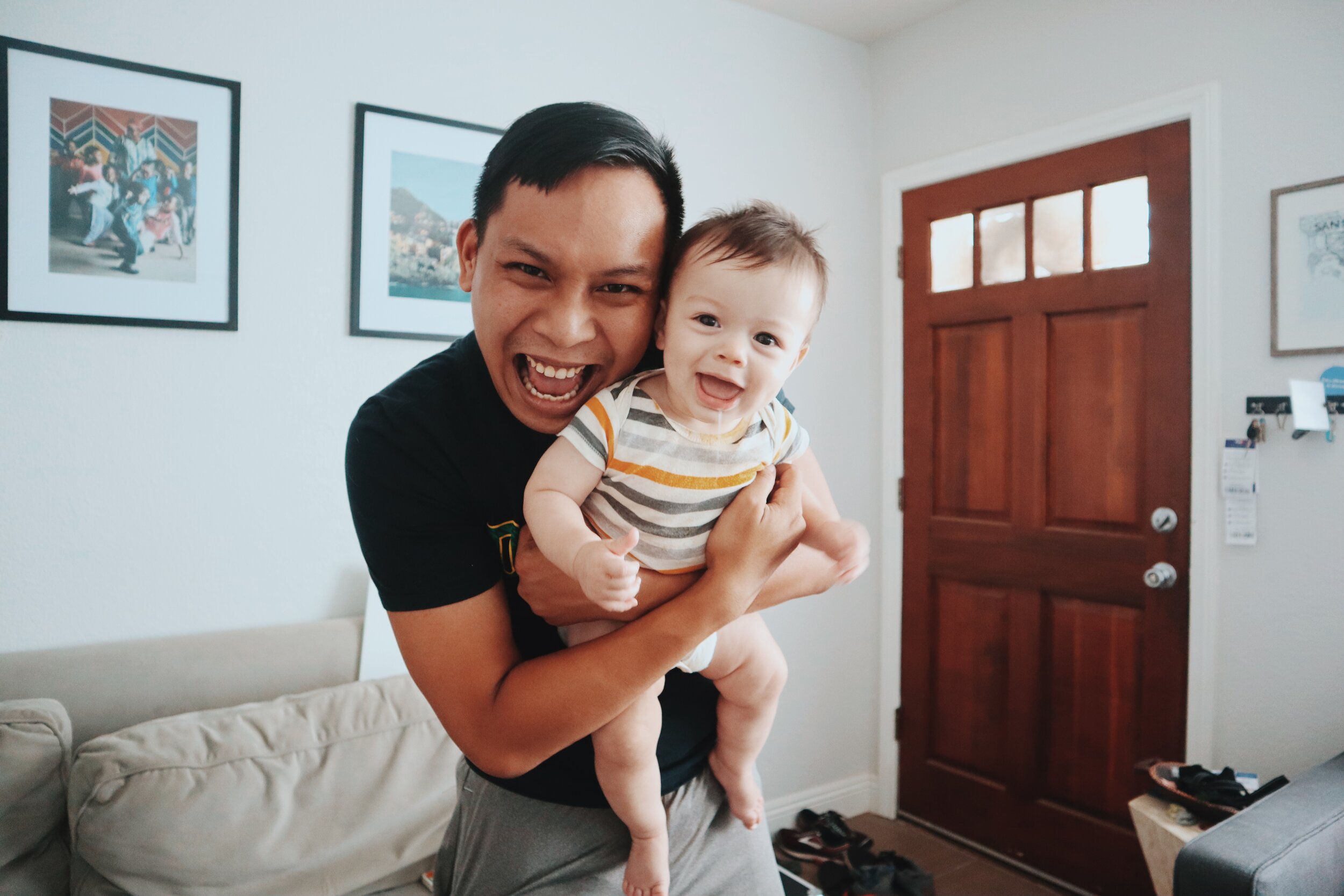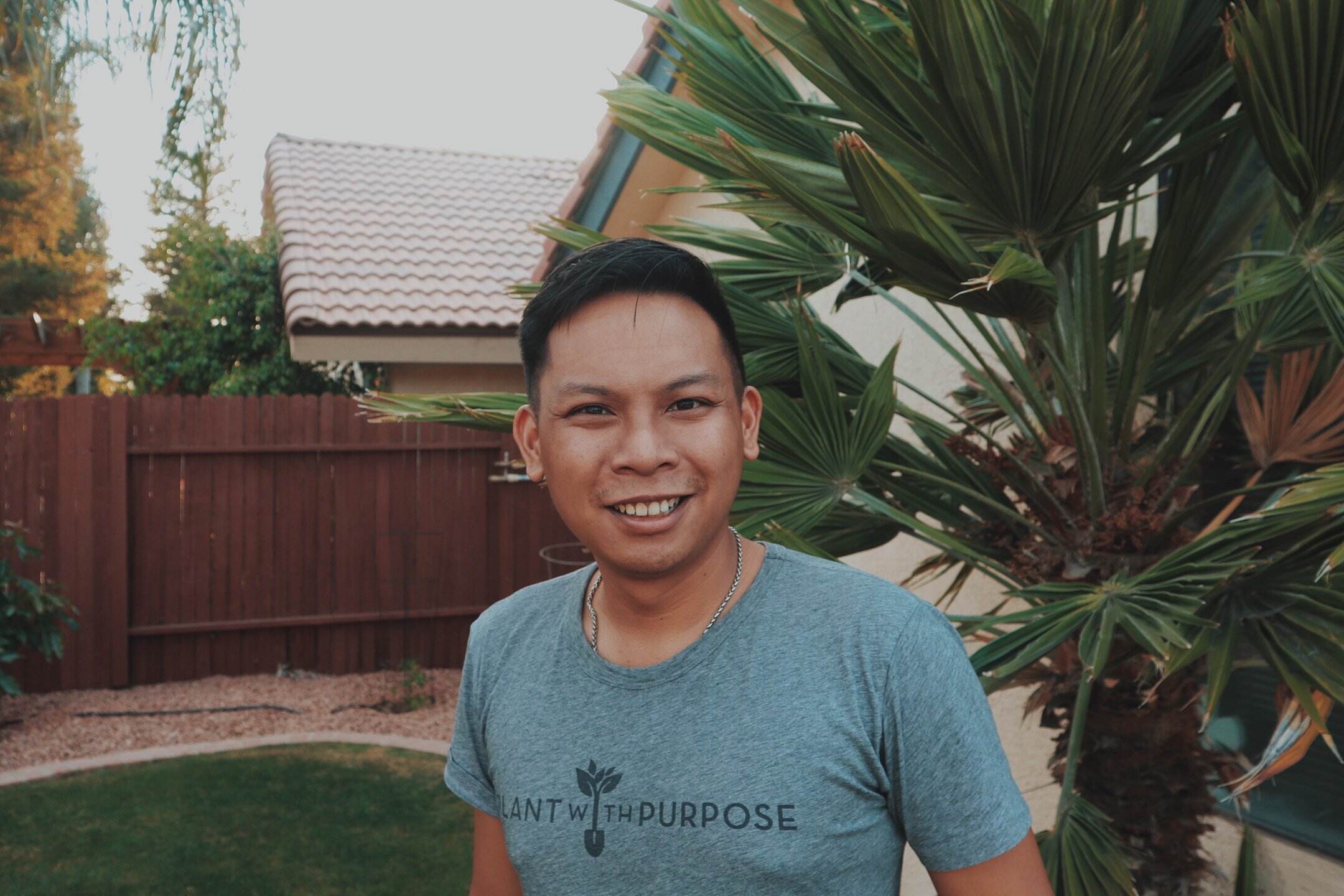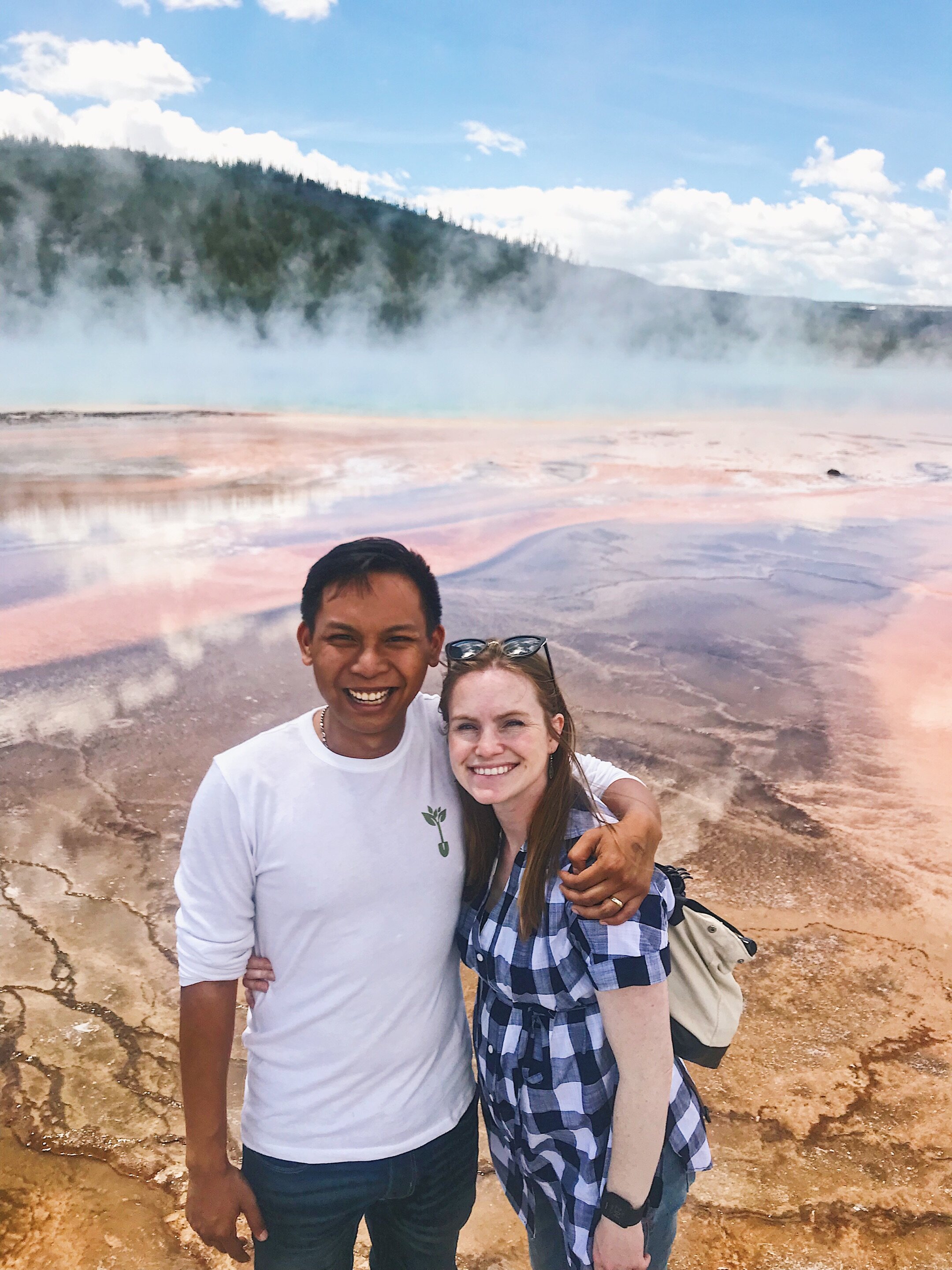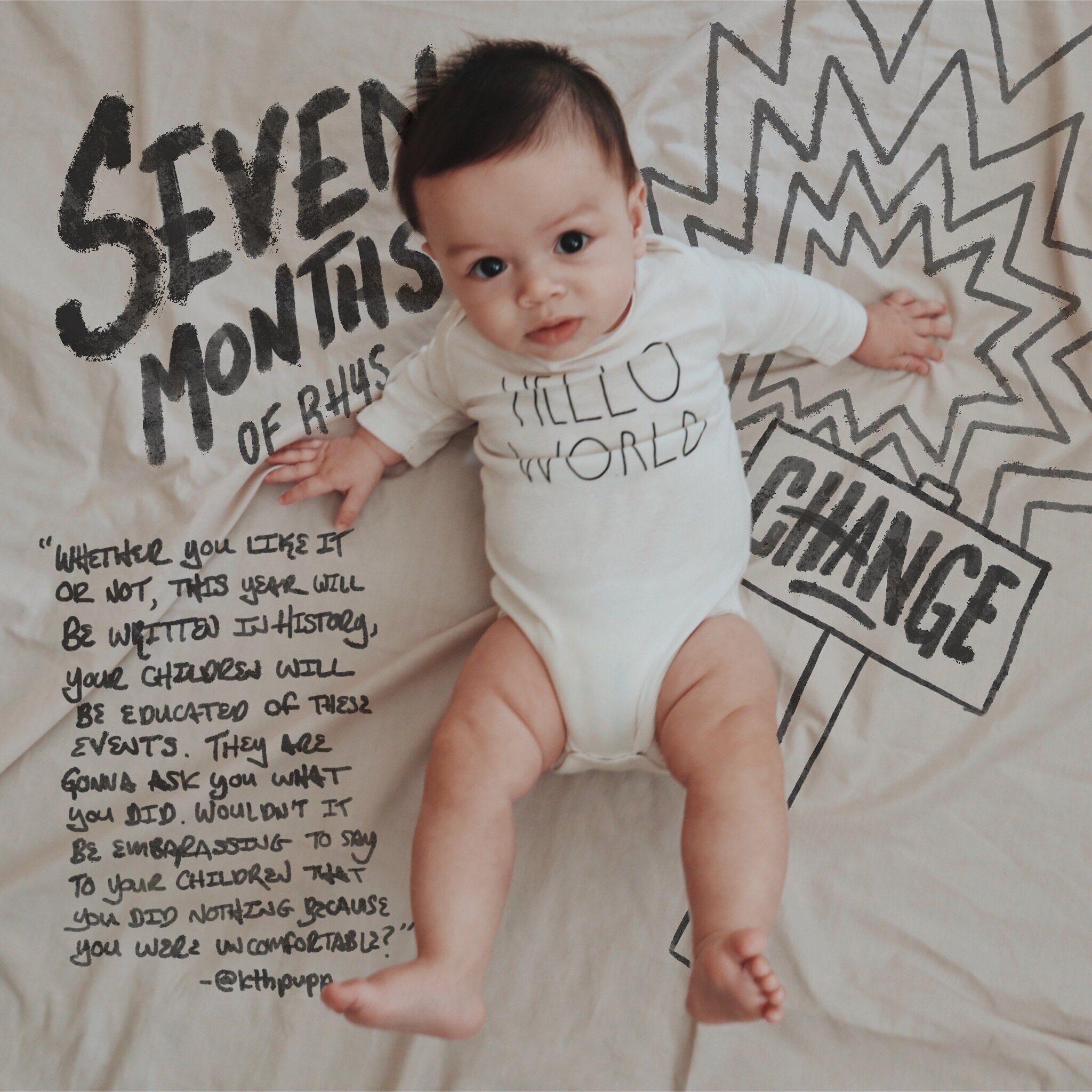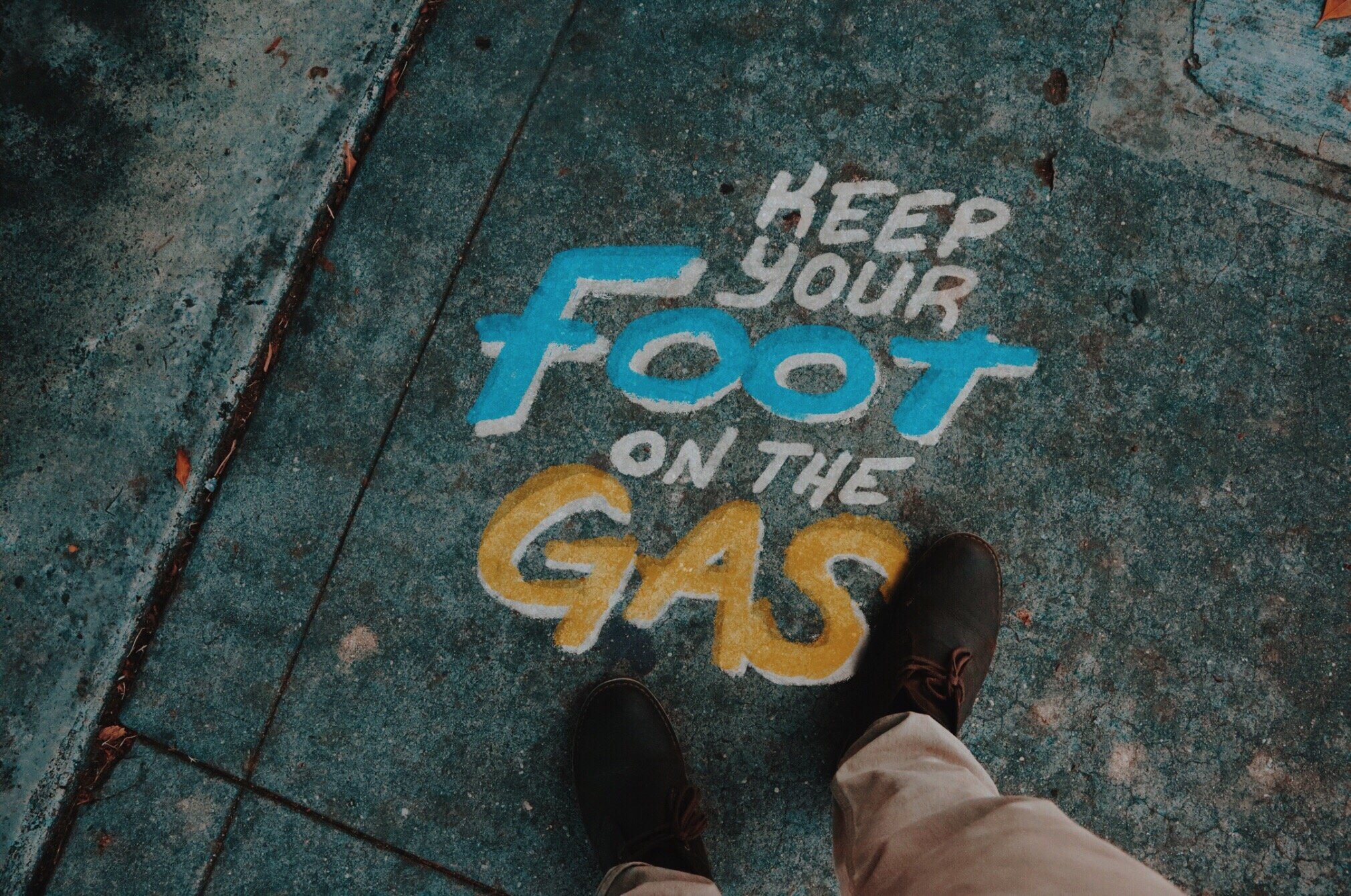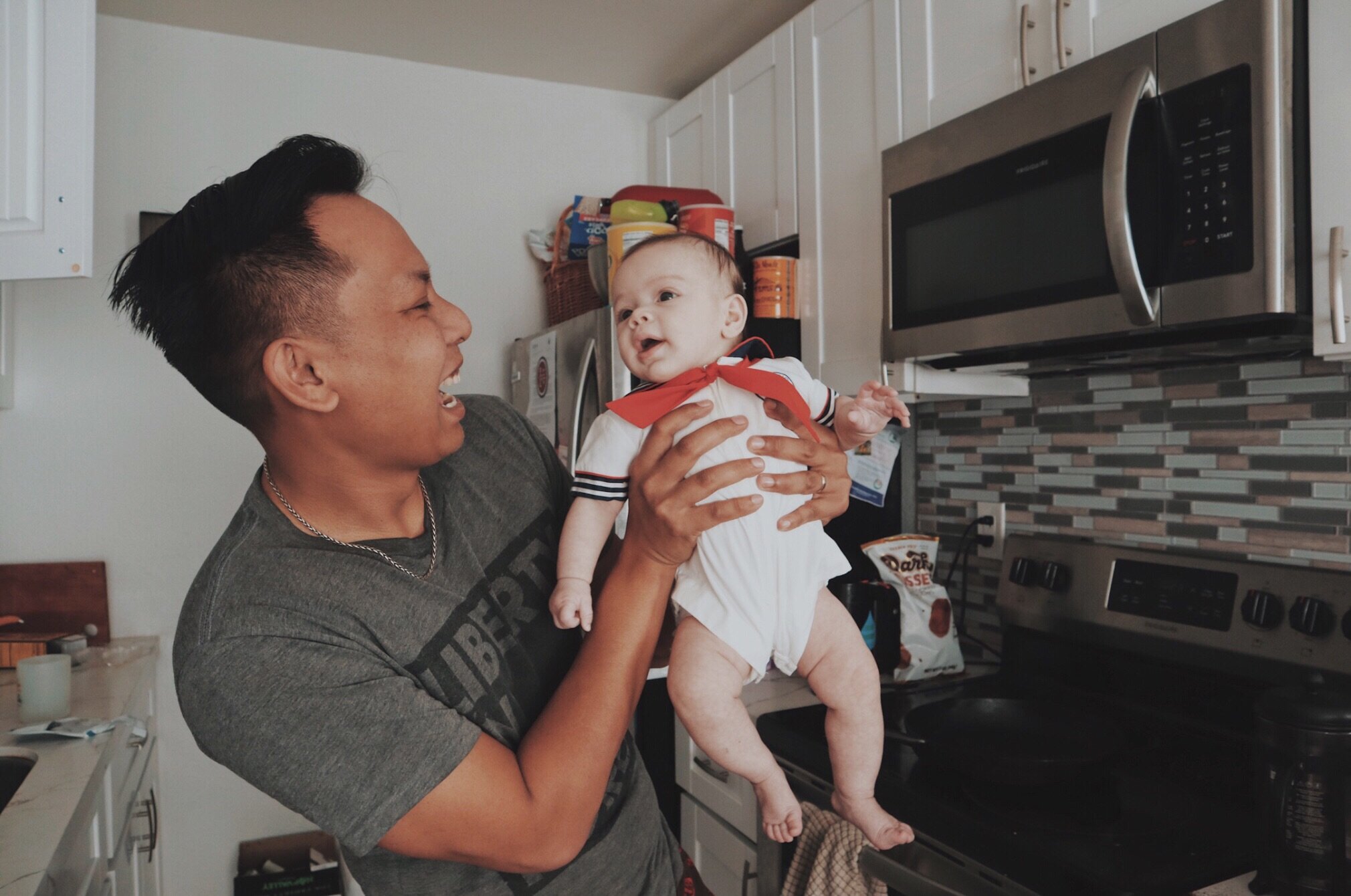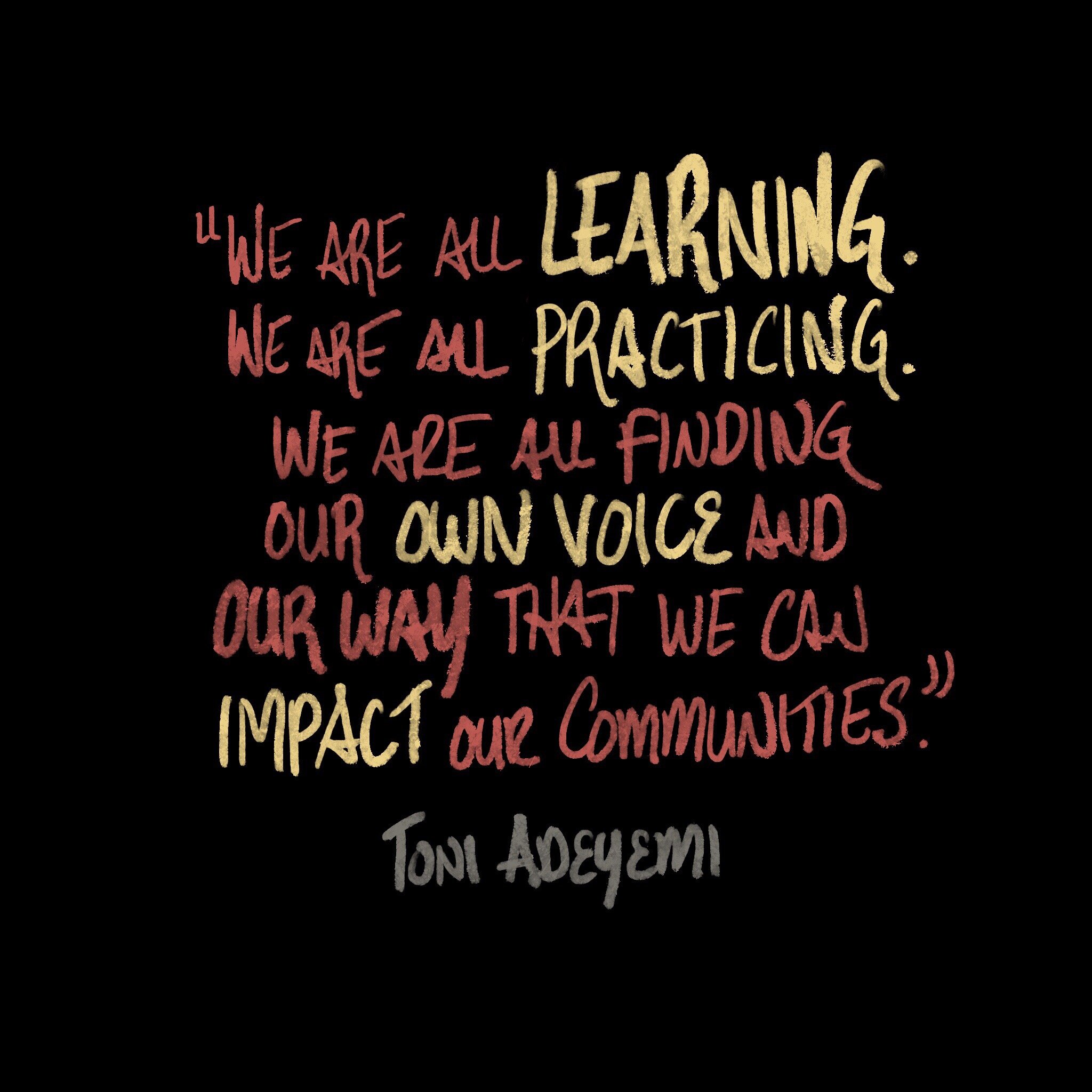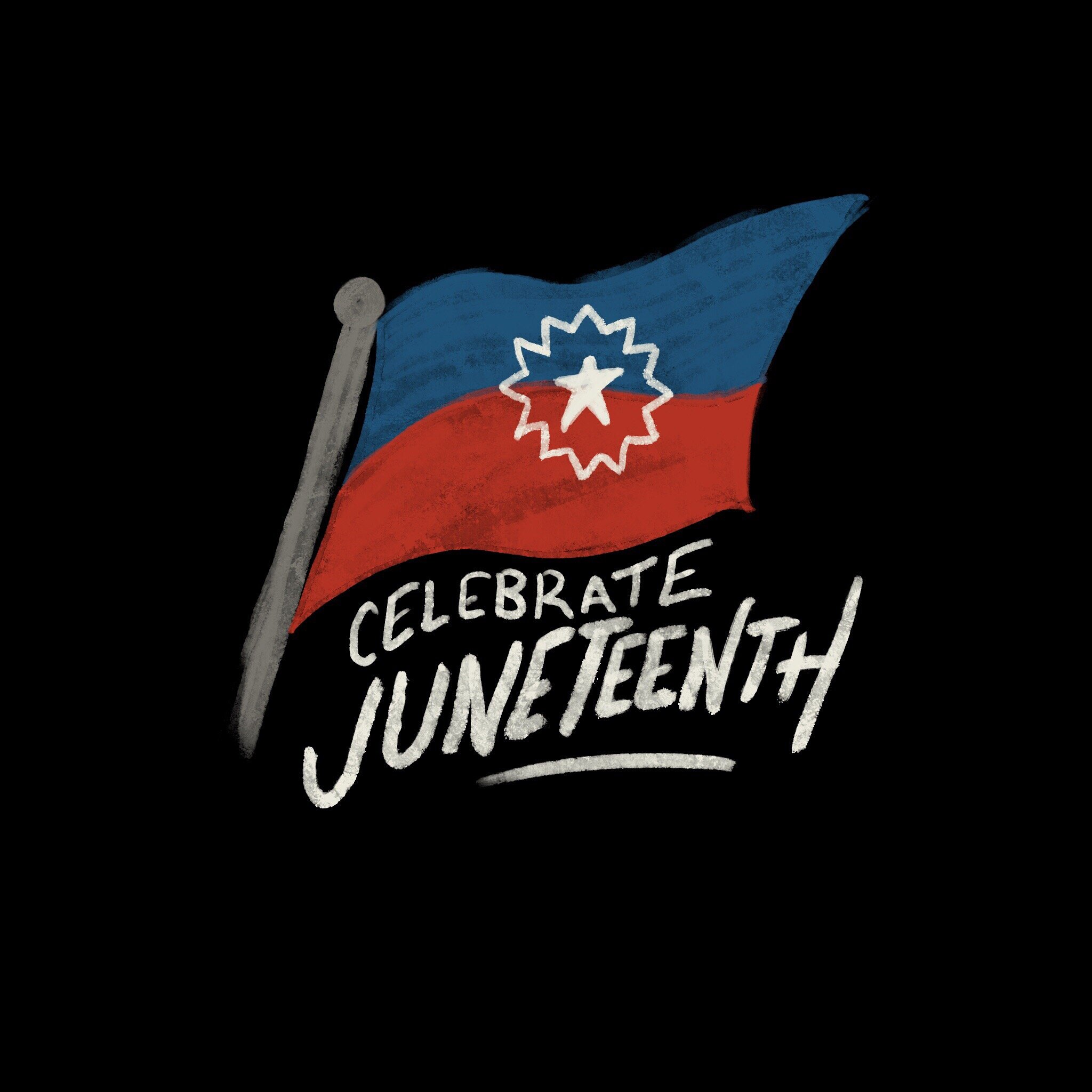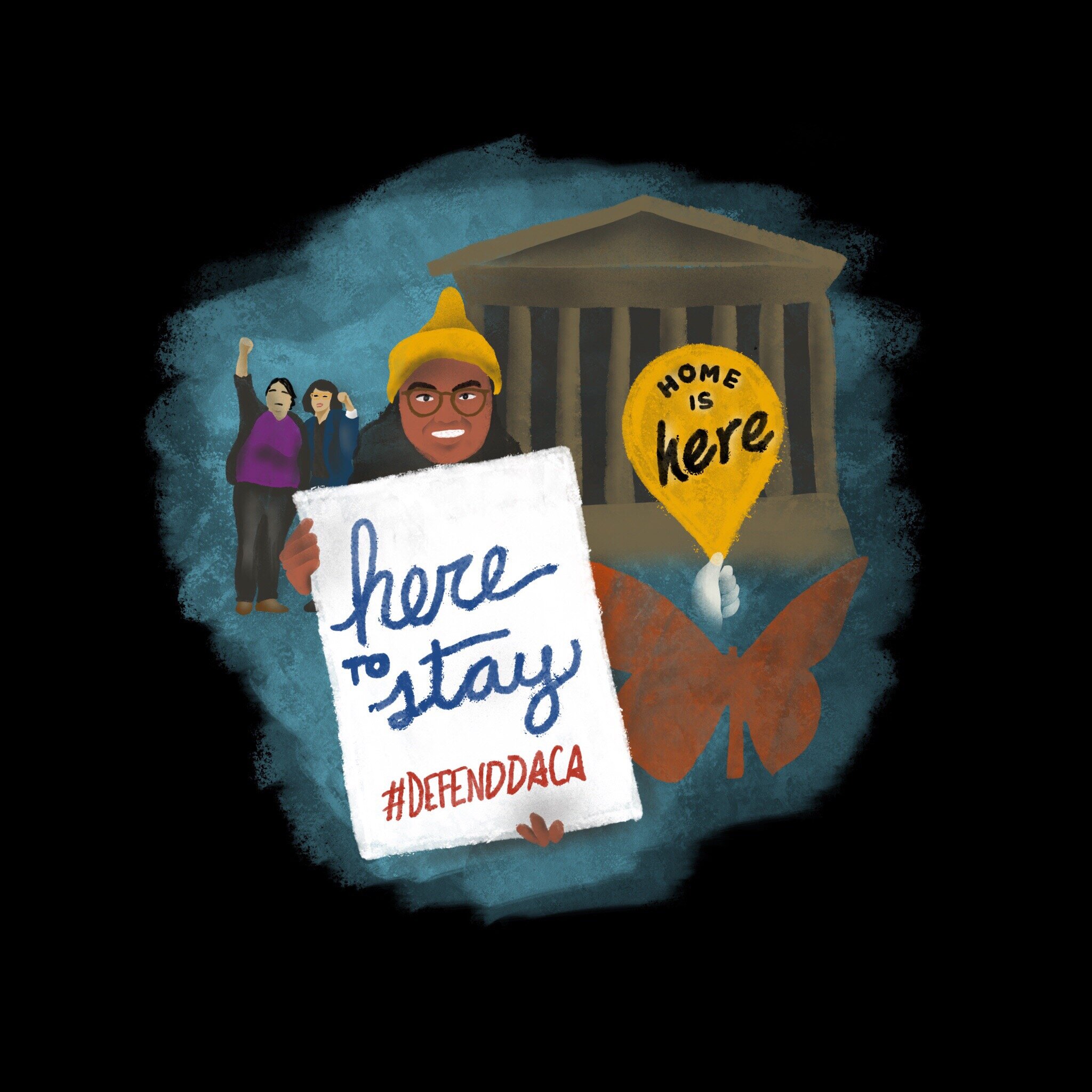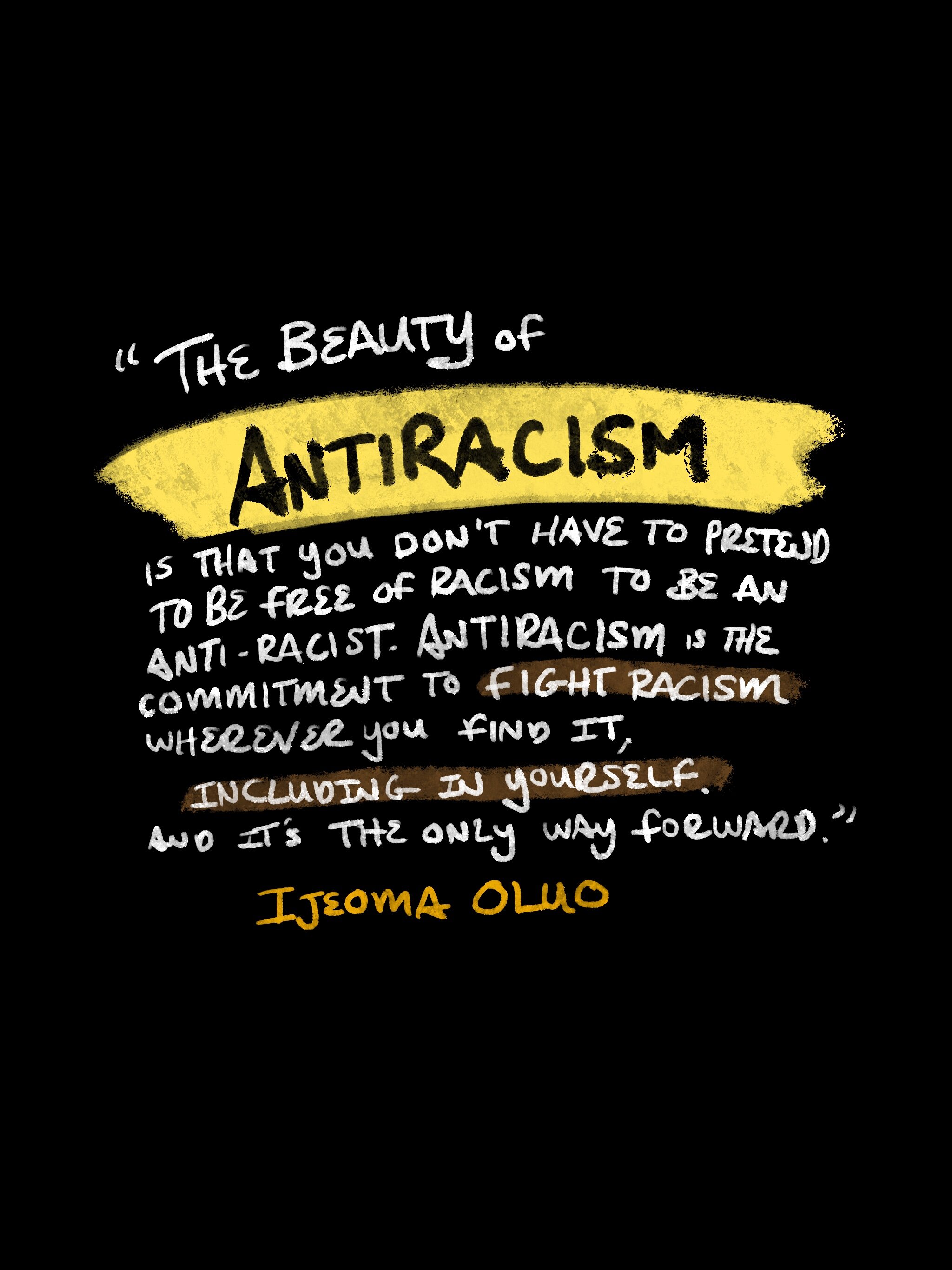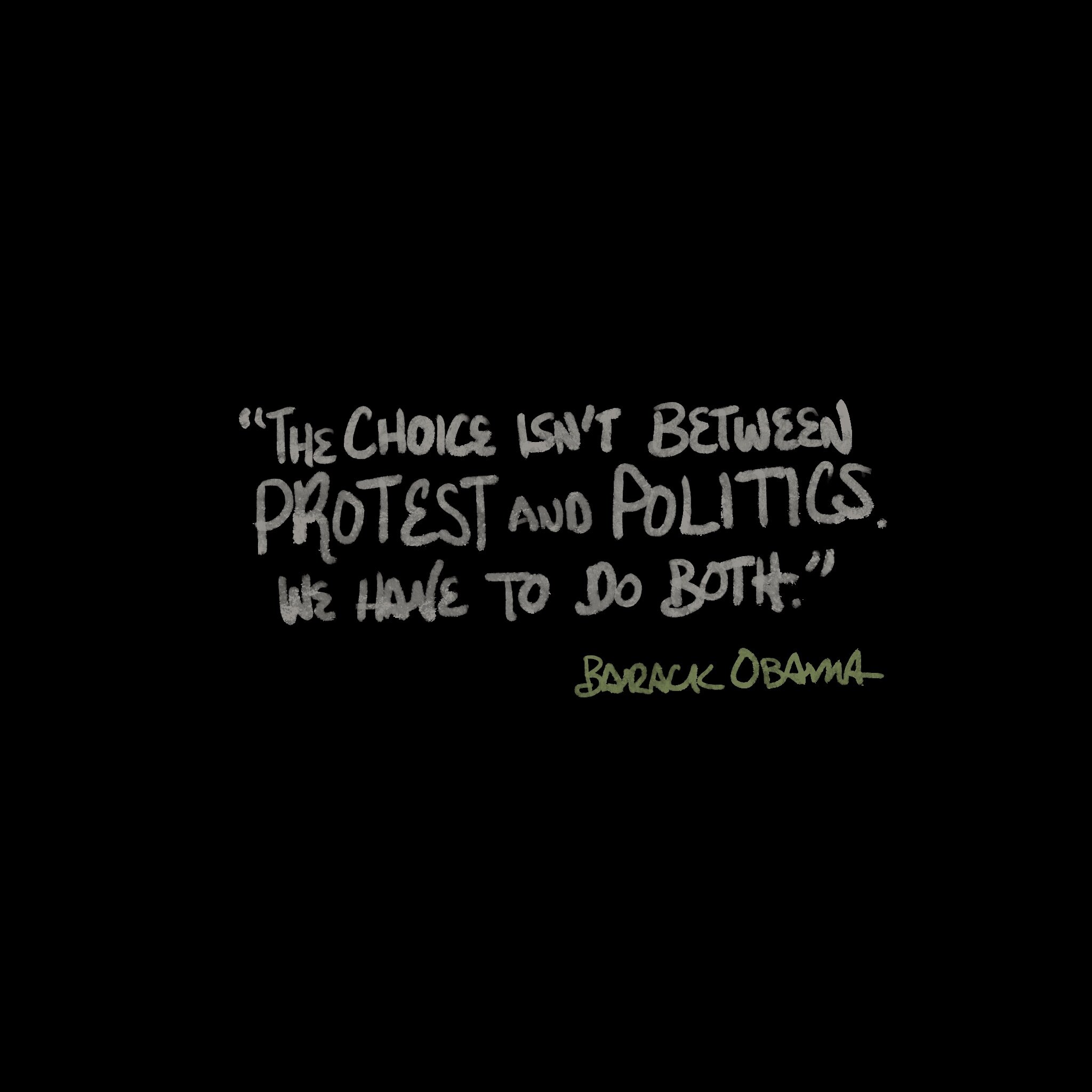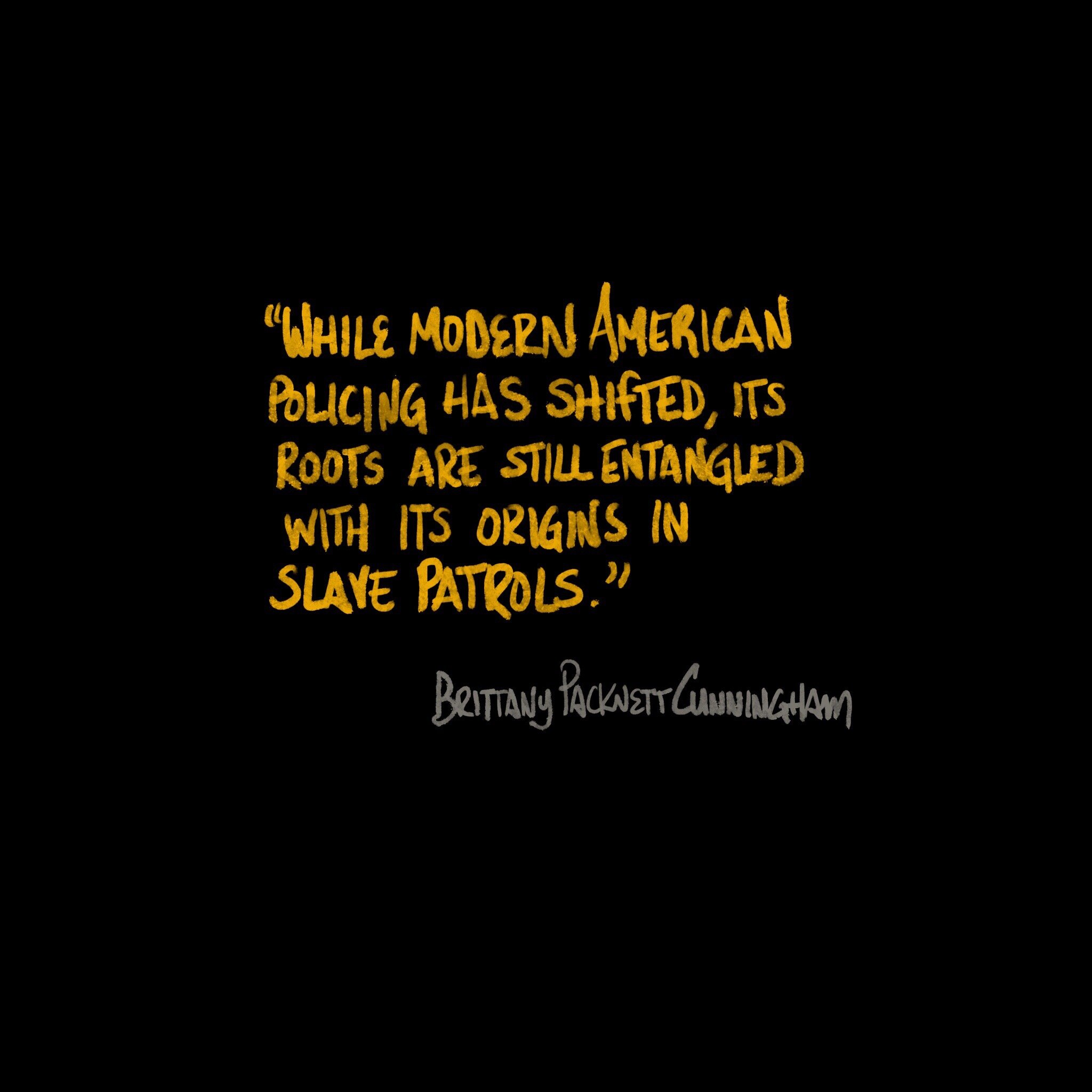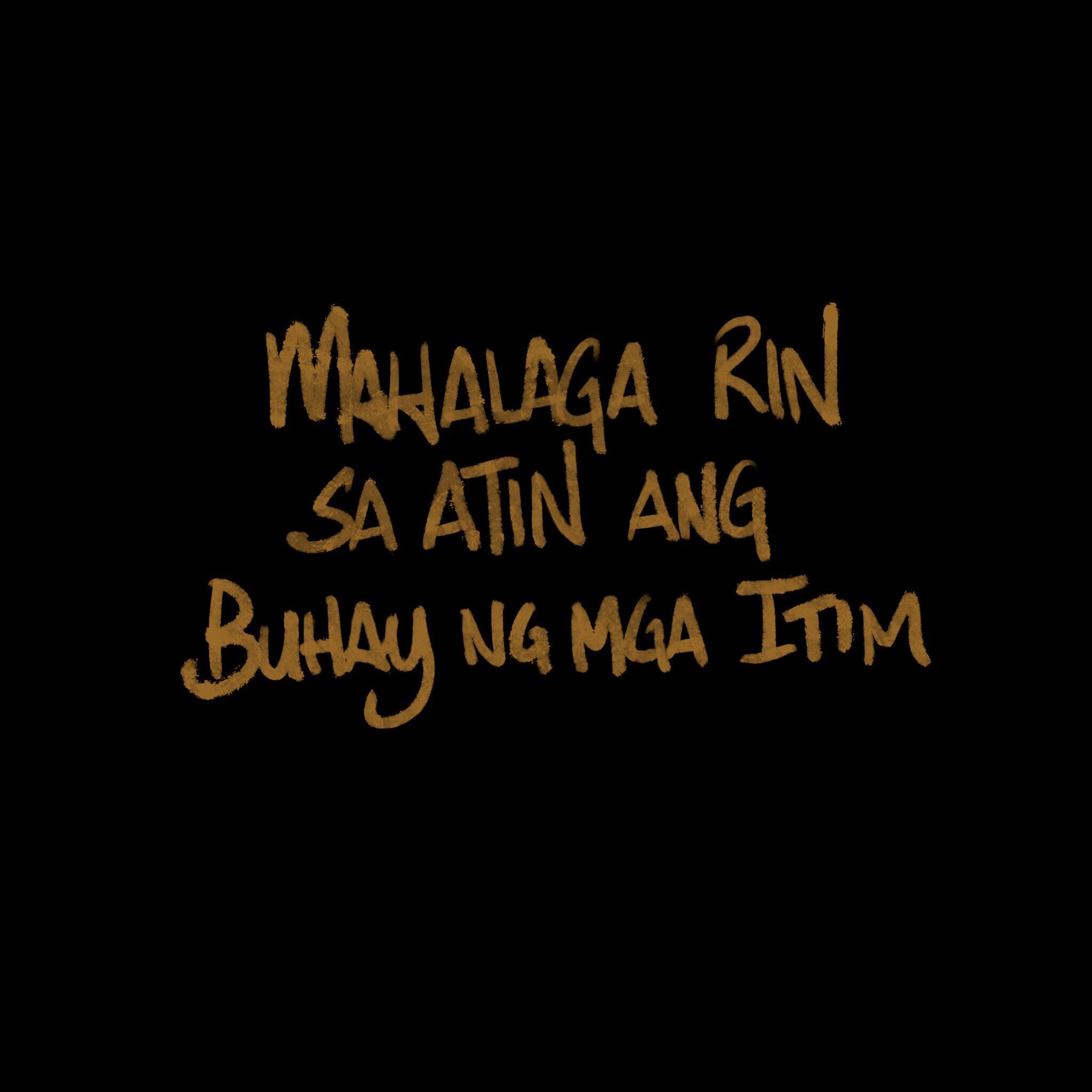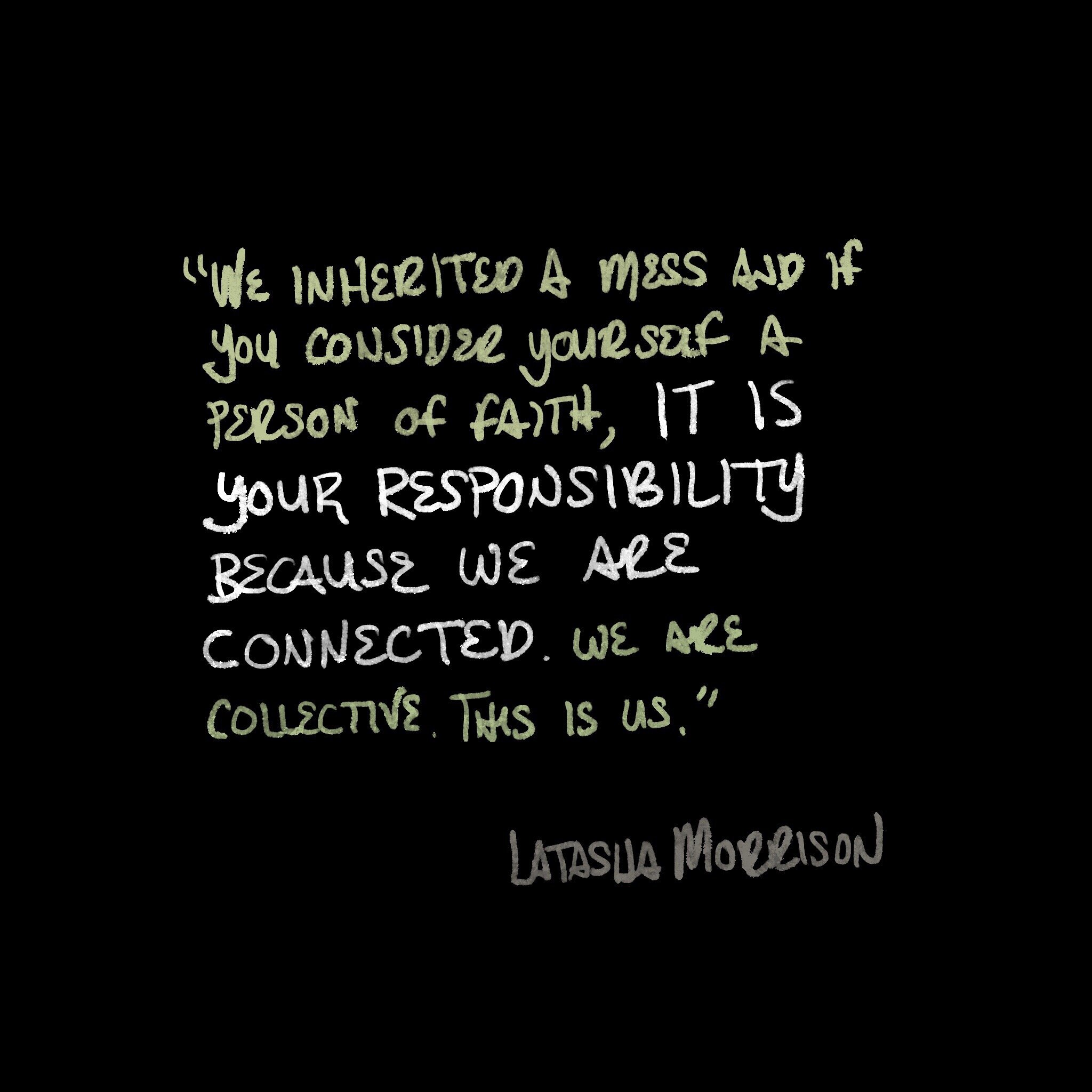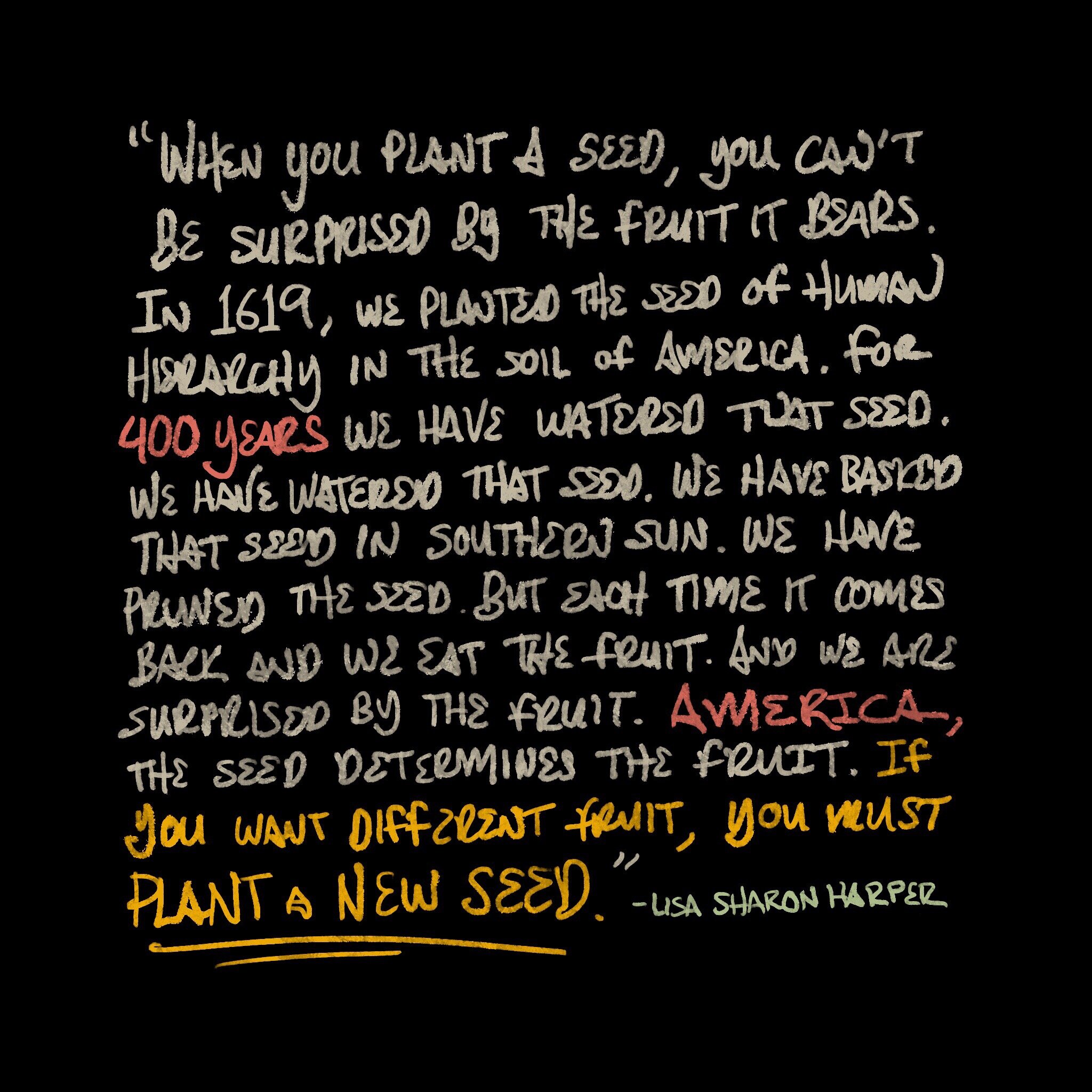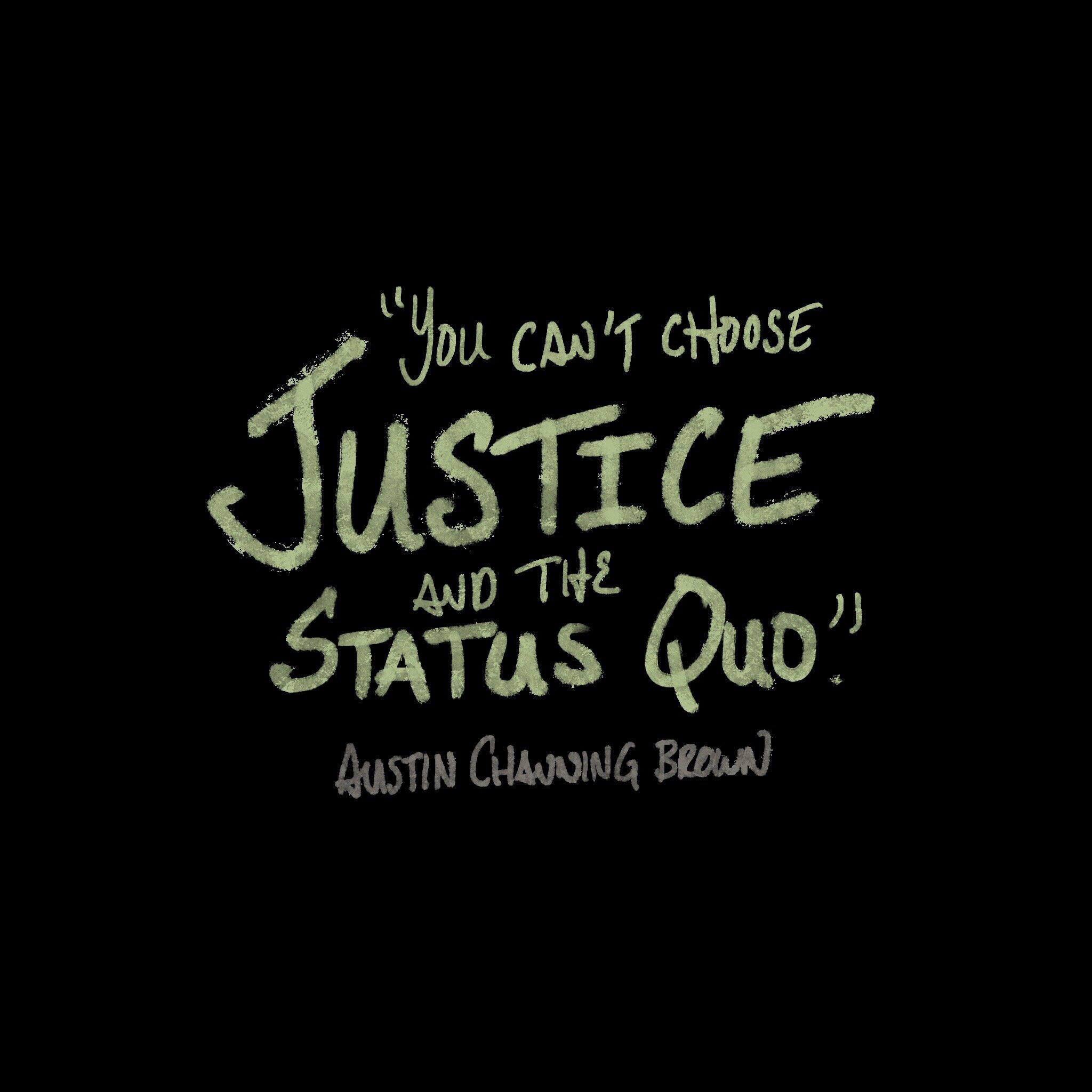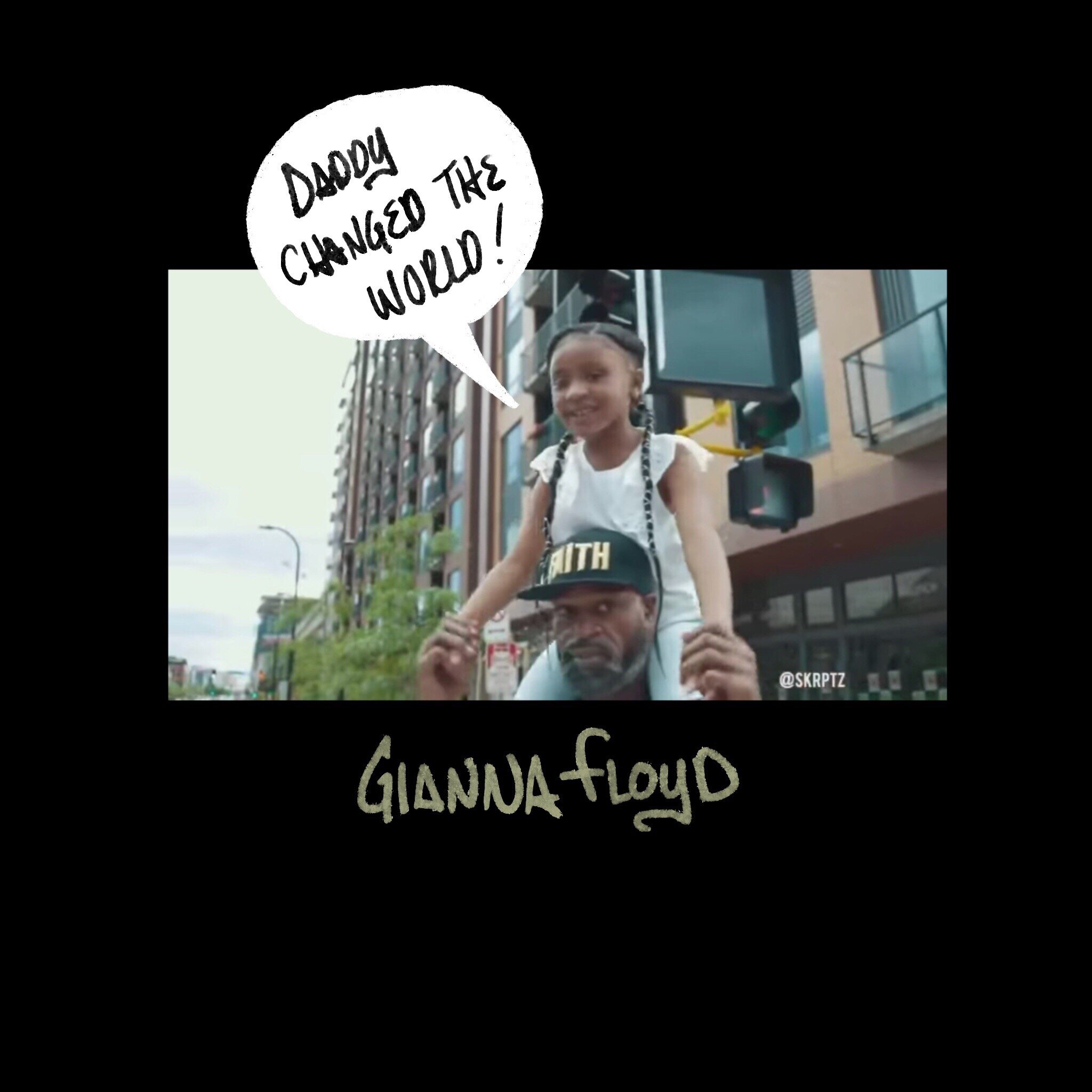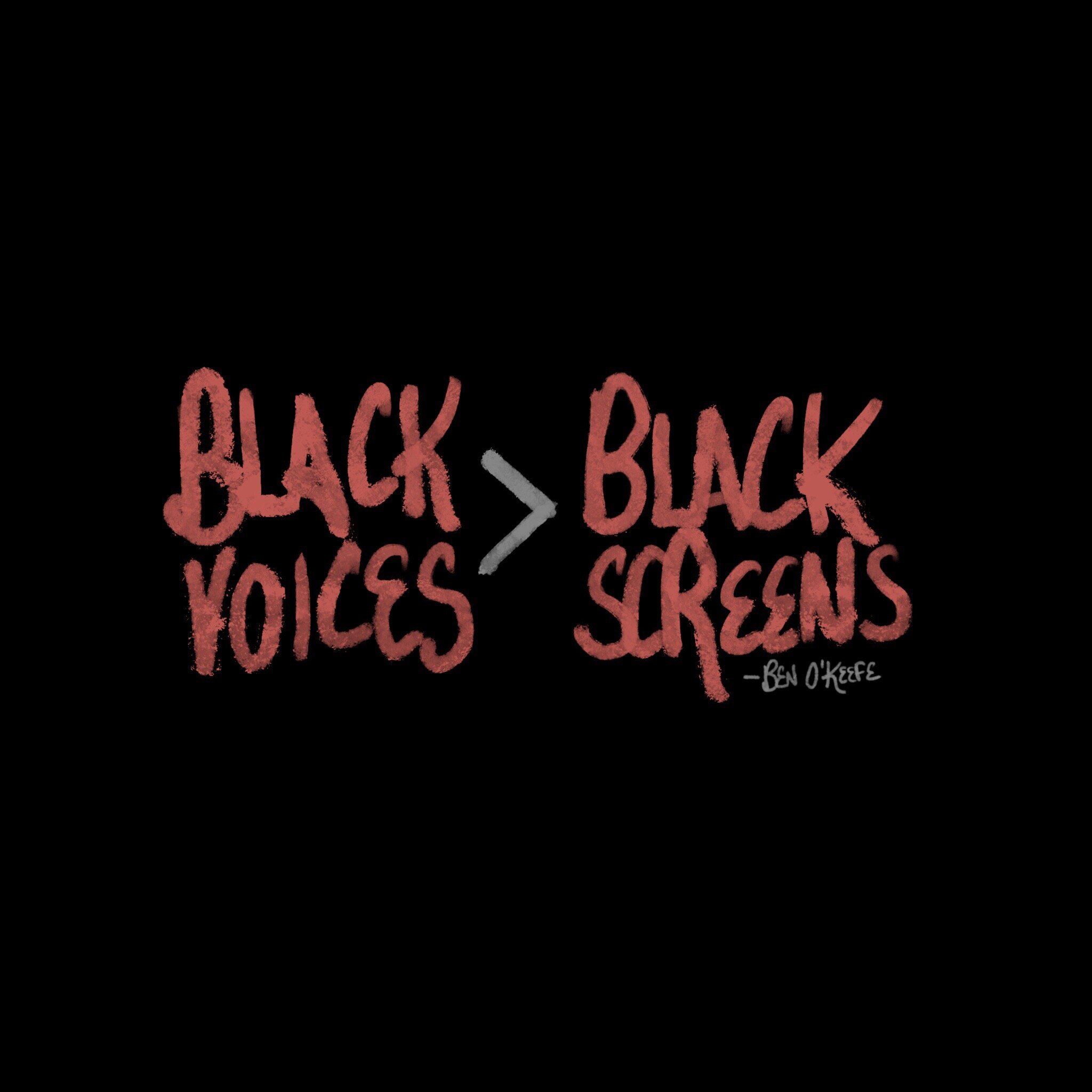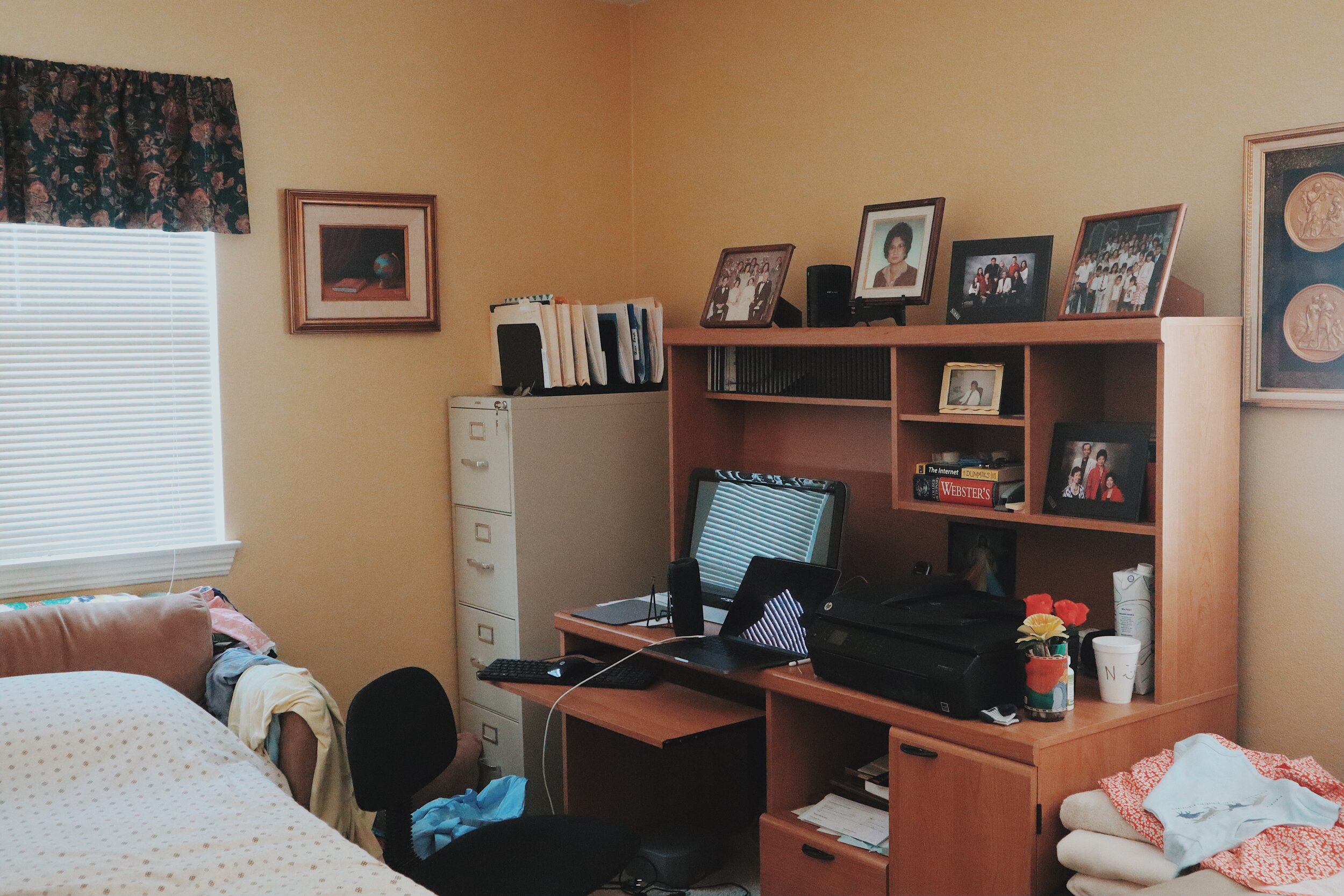#153 Rhys Visits Felino
01 June 2020 // Cypress, California
In a typical year my creative agenda looks like:
Travel the world
Talk to different people
Find things that fill me with wonder
Share that hope can be found in the hardest places
And
This year:
Keep my family safe and healthy
Speak up against racism and intolerance
Grow spiritually through the inner journey
Share that hope can be found in the hardest places
And actually, I hope that future years will be a BOTH-AND kinda thing
#154 Blackout Tuesday
02 June 2020 // Carson, California
“If you’re not working for justice, stop calling for peace.”
—Bernice A. King
⚖️
If you’re feeling upended by the chaos of this several days, I get it. And I’m not surprised to have read countless calls for peace and prayers for unity.
✊🏾
I’m all for peace and unity. That’s part of the end goal. BUT-
💥
Working towards peace is NOT the same as going back to how things were a week ago, a year ago, five years ago, or decades ago. For people of color, especially our black neighbors, there has never been peace.
💥
So please, keep praying for peace, because I believe that when those prayers are said sincerely, they’re met with a call to justice. And that will mean listening, learning, speaking up, voting, advocating, donating, and creating new systems.
🙏🏽
And make room for righteous anger. If God did not want us to ever get angry, he wouldn’t have put anger in our emotional toolbox. Anger is our God-given indicator that our sense of justice has been violated. And in our country, from the very beginning, racial justice has been very much violated.
#155 A Big Boy
03 June 2020 // Carson, California
Be honest, were you a bit confused by the ethics and effectiveness of #blackouttuesday yesterday? ⚫️ Was it a strong show of solidarity? Was it performative? ⚫️ Here are some thoughts its potential strengths and dangers.
1️⃣ When people no longer find comfort in being silent or neutral, change grows way more likely
We’re seeing this right now. Big corporate brands that do a cost/benefit analysis for everything are finding it more harmful to stay silent than to speak… to oversimplify, that’s good because silence perpetuates violence. I’ve seen the wave of support for Black Lives push so many people I know forward. From supporting harmful systems to questioning them. From silence to solidarity. This is the power of having a participatory gesture. This is the potential of BlackoutTuesday.
2️⃣ A movement’s symbols are important, but they can never be mistaken for real action.
This is the tricky thing about a symbol. In some ways it calls us into action, but in other ways it can stop us. Like, if you feel like you’ve already played your part because you posted a black square and an MLK quote, then that post is actually hindering other critical actions like calling your local officials, donating to meaningful orgs, educating yourself, or voting. This is the danger of BlackoutTuesday.
3️⃣ The most important question is which voices are leading the change
Jeanna Kadlec (@jeannakadlec): my instagram feed this morning is just a wall of white people posting black screens. like... that isn't muting yourself, babe, that's actually kind of the opposite! it's taking up an absolutely WILD amount of space and does nothing!
This day was meant to amplify black voices. If you’ve posted a square without giving a signal boost to black voices, your assignment is incomplete.
4️⃣ If all this seems like a lot, don’t let that stop you
Getting corrected doesn’t feel good. It’s why we have a psychological impulse to be defensive. But resisting that urge is necessary for growth. Letting ourselves grow and evolve is a part of the process. Own your mistakes and don’t let shame fuel your silence.
#156 Afternoon in Carson
04 June 2020 // Carson, California
Who else saw the video? I think it was the most moving thing I’ve seen all week- and that’s saying something given the kinda week it’s been.
But there’s Gianna Floyd- George’s girl
up on the shoulders of an uncle
shouting in amazement. Daddy changed the world!
He did, and as the world continues to change, I want her, Rhys, and all the kiddos of that generation to grow up in a way different world than I have.
Donating to organizations that have been doing the daily hard work of making that change happen is one of the best ways to accelerate it.
I’ve got some favorites to highlight here. Both newly discovered faves and longtime faves. Check my slider to see the specific things I love about each of them.
Here are three things about helping these and other orgs:
1️⃣ The best way to support these orgs financially is through a recurring monthly donation. Single gifts are fine, but subscribing to donating helps far more.
2️⃣ When applicable, subscribe to their newsletters! As someone who writes these sorts of things, I try to make our emails full of learning opportunities.
3️⃣ Lend vocal support to your favorite orgs. If you wanna be humble and keep the amount you gave to yourself, that’s cool. But sharing the name of the orgs you support- financially and otherwise- helps create mass appeal.
On that note, who are your favorite racial justice orgs?
#157 Babarú
05 June 2020 // Carson, California
I’ll be honest, the moment we’ve been living in the past couple weeks has been a surprise to me. Anyone else?
More so than I’d like to admit, I started feeling like the necessary systematic changes we need to deal with racial injustice were out of reach. I saw how churches and other institutions were very passive in responding to Charlottesville and felt so disappointed in what seemed like low-hanging fruit to me. I was discouraged when even people’s responses to fighting against a non-human VIRUS were more shaped by their political dogma than anything else.
Even now, I remain very CAUTIOUSLY hopeful. But hopeful, still.
After all, it was only a few posts ago that I shared the story of how I prayed to be a dad, only barely believing it would come true while trying. And that shaped my understanding of hope, and my belief that hope isn’t a wish. It’s action.
Hope leads to showing up. Showing up leads to action. Action leads to change.
There is still so much more to do. But I don’t want myself or anyone to go back to an environment of hopelessness and inaction. I’m optimistic, but also concerned, because I know how short the public attention span is. We’ve got to stay this uncomfortable with the following:
• Silence
• The myth of neutrality
• Vague platitudes that don’t name the evil of racism
• All lives matter
• “Both sides” talk
If you don’t quite understand the importance of being uncomfortable with these and sincerely want to learn, let me know. But.
Unless the discomfort of staying the same is greater than the burden of change, nothing happens.
#158 Sesame Street: Coming Together
06 June 2020 // Carson, California
A friendly reminder that:
The work is structural AND spiritual
The work is political AND personal
The work is holy AND hard
I’m a big believer in being a BOTH/AND kinda person. Sometimes people respond to racism by saying “the only answer is God,” which I find partially true. But by saying that, we run the risk of forgetting that God does work THROUGH us. Go ahead and start with prayer, then ask yourself the tough questions.
Here are some questions I think are worth asking ourselves:
ABOUT OUR COMMUNITIES
🤲🏽 What can you do to support BIPOC in your community?
🚔 What are your local leaders’ policies regarding police brutality?
ABOUT OUR LEARNING
👩🏾🏫 When were you first taught about race and culture? What about racism?
📚 What do you want to learn more about?
ABOUT OUR ACTIONS
✊🏾 What role do you have to play? How do you plan to help end systematic oppression?
🗣 Who in your life do you need to have a difficult conversation with? Who has reasons to listen to you in a way they wouldn’t listen to activist leaders?
I don’t want to just make this an abstract idea but a tangible exercise, so please, I’d love to hear your actual answers! I have some places to respond in my stories today. I have my own answers up there too.
Ijeoma Oluo says, “when we identify where our privilege intersects with somebody else’s oppression, we’ll find opportunities to make real change.”
#159 Packing Rhys
07 June 2020 // Carson, California
A crowd has climbed onto the statue of colonial King Léopold II in #Brussels chanting “murderer” and waving the flag of the Democratic Republic of Congo where his atrocities took place.
You may have noticed many other countries joining the US in support of Black Lives Matter. That is so, so important.
The poison of white nationalism and racism that have flared up over the past five or so years isn’t limited to the United States. You can go across the globe and find so many places where white supremacist rallies and far right authoritarian rulers have emerged.
Also, it isn’t too uncommon of an idea in European countries, Canada, Australia, New Zealand, and others to believe that racism isn’t really present in that country because, “it’s not like it is in the USA.”
Yes the US’s problems are seen by all, but racism has crossed every border.
Finally, King Leopold was one of history’s worst. Really. The book King Leopold’s Ghost is a good place to learn.
His name should trigger the same cringe as Hitler’s. Most of his victims were black, and he’s been more obscured by history.
#160 Anniversary 8
08 June 2020 // Carson, California
“If today's church does not recapture the sacrificial spirit of the early church, it will lose its authenticity, forfeit the loyalty of millions, and be dismissed as an irrelevant social club with no meaning for the twentieth century.”
—MLK
If you’re a churchgoer, what has your church been doing in the struggle for antiracism?
To paraphrase Latasha Morrison, for us people of faith, it’s our responsibility because we are connected. Church leaders, if you are not speaking against racism, your silence allows it to continue and to be passed on to the kids in your VBS classes. Churchgoers, hold your leaders accountable, too. If your leaders haven’t said much, ask why.
Martin Luther King said that if churches go quiet, they turn into irrelevant social clubs. That phrase– irrelevant social club– captures exactly how I feel about what so many churches are turning into. The data shows I’m not the only one who feels this way. Between 2007 and 2017, two thirds of churchgoers between 23-30 stopped, with 70% saying the reason was related to the church’s stance on social issues.
What keeps churches from participating? Some say it’s because they don’t want to go “political.” To that I say, racism is not a political opinion, it’s in fact a sin. Also, that approach implies that politics is a realm of your life where your faith switch flips off, and I know most would disagree to that. Maybe churches feel ill-equipped or are unsure what to do. There’s a TON of resources out there, and I’m happy to recommend some. Perhaps churches are afraid of upsetting certain people. If that’s the case, you are no longer stewarding your influence.
It absolutely doesn’t have to be like this. Here’s how to do better:
Be specific in calling it out – When denouncing racism and racial injustice, saying things like “it’s not a skin issue, it’s a sin issue,” or “let’s just learn how to love each other,” are extremely fluffy and don’t actually say much. Name the instances of injustice that stir up righteous anger. Better yet, get to know the context of these issues in your neighborhood and community.
Walk the talk – Don’t claim to be “multicultural” just because you have about a dozen brown families who join. What does your leadership look like? Your worship? Most American churches, by nature of demographics, will be majority white- but the key to dealing with this is to understand that your perspective is limited by this. Read The Next Worship by @smvanopstal for more!
Understand the history of church complicity – Sadly, the church has a history of not always doing the right thing. A great way to learn more about this is @jemartisby’s The Color of Compromise
Examine the lack of nonwhite perspective in your theological formation – I’ve read a LOT of theology books during my spiritual formation from different eras and traditions. SADLY fewer than five were by writers and theologians of color. One big voice to learn from (among many) is the recently passed James Cone.
#161 On the other side of freedom
09 June 2020 // Carson, California
This week, I’ve been really happy to be working somewhere that considers and validates my suggestions on how we could be proactive as an organization in fighting against racism.
Four ways workplaces can tangibly contribute to antiracism:
• Providing flex time for staff to do antiracist work
• Curating resources for understanding racism in the context of their industry
• Black and brown senior leaders
• Flex time to participate in civic engagement
#162 The Rhys Throne
10 June 2020 // Carson, California
After having spent three unexpected months away from San Diego, the city has strangely grown on me. I still often feel like it’s not an obvious match for the sort of place where I see myself long term, but perhaps that’s changing. I think that the next few years might reveal a lot more. Especially while Rhys is in the before-school part of his life.
Here are the things I’m loving about it a lot:
I love the sheer diversity of the town. I can find so many different ethnic communities, eateries, and hangouts around. That matters more and more to me.
It’s starting to seem like there are more opportunities to build connections and relationships around town. I’ve struggled with how slowly this has happened so far, but it does seem like that might be different after a few years.
As the pandemic passes, and we start to rebuild our lives in a new version of the town we used to live in, I’m so curious about what shape it will take.
#163 Rhys on the Go
11 June 2020 // Carson, California
What if… your city could double the amount of resources dedicated towards transportation, parks, education, economic development, homelessness solutions, environmental services, public health, and mental health? Right now, with so many people unable to pay rent, what if your city passed rent relief to prevent evictions, which would make the economy and homelessness much worse? What if the way to do this also addressed the injustices that your Black neighbors were subject due to unjust policing?
This is the case for defunding police departments. Budgets are moral documents. Check out what percentage of city budgets go to police departments: In San Diego, it’s 37% of the budget. In Columbus, it’s 68%. Dallas, 60%. Milwaukee, 45%. Even strictly from a financial standpoint, stacking all your chips in one spot like that isn’t wise.
But also… I’ve been bothered by the recent failings of police brutality in nearly every major city during the protests. The elderly man in Buffalo. The recent grad in Columbus who was killed. The child teargassed in Seattle. The students in Atlanta dragged out of their car, and so on. I’m somebody who naturally wants to believe the best in people, and I believe people who are sincerely committed to doing things the right way embrace accountability.
This is what accountability looks like:
1) Reallocating funding. Imagine the positive impact it would have to distribute those funds among all those other needs. That would in turn bring crime down in a more restorative way.
2) Understanding the way policing has been used to perpetuate injustice. The design of the sheriff’s badge evolved from the insignia of slave catchers. The problem isn’t (always) with the individual officers, but with the way the whole system was built.
3) Reassign certain functions of police departments to other agencies. Narrow the focus of a police department so it can be more effective in that area.
In Eugene, first responders who specialize in mental health are dispatched to public incidents related to mental health or addiction.
In Camden, once one of the most dangerous towns in the country, reimagining policing into a community based model resulted in a mass dropoff in crime. Robbery was down 62%. Murder was down 32%. All crimes were down 41%.
Don’t let your imagination be held back. We can do much better. This is the harder part of racial justice. But a necessary one. It goes beyond saying “we stand with our black community members” and actually reassembles a system that’s been stacked against them.
#164 Rainbows Puppies Cookies Run
12 June 2020 // Carson, California
In 2016, I started occasionally attending City Council meetings. If you may recall, it was a very intense political year, and not the most productive one at that. I started to question what use it was to have dialogue when it seemed like everyone was very much entrenched in their own beliefs.
Going to those meetings reshaped that. I recall when one community member stood up and shared her story of being abused by a corrections officer how much it transformed the energy in the room. Everybody was troubled by what they heard. Everyone was motivated to do something.
I’m far from an expert in local governments, and still need to do a ton of Google searching to better understand how budgeting and different agencies work and all that, but my biggest lessons from showing up were these:
• Younger people are often underrepresented in shaping local-level decisions.
• That’s somewhat by design. So many votes and forums are held on weekdays during working hours. What do you suppose the demographic of people who are free at that time looks like?
• City Council is an important role. Take the time to know the interests of your Council.
• Public comments matter. Like the story I mentioned above, councilmembers are often more receptive to public pressure than other positions.
Over the past week, I saw literally hundreds of San Diegans, mostly younger people, call in to call on City Council to disapprove a budget that increased police spending and to instead allocate that funding to rent relief and community services.
There’s a second part to this story, where the Council still voted 8-1 to approve the budget. I couldn’t believe that such a clear message sent by constituents would be ignored by the council. I later learned that this was partially because San Diego has a “strong mayor” system, where if the budget was disapproved, the mayor would still be given a say over how the funds were used. A couple councilmembers who would’ve preferred to disapprove voted to approve to protect the hard-earned funding they won for other causes.
That episode was disappointing, but it was encouraging to see the turnout, and how many people in my town are now paying attention to this arena of decision making. Sometimes it takes monumental events, even disappointing ones, to grab our attention. But once that happens, you can never go back to not knowing.
#165 Rhys’ Kicks Game
13 June 2020 // Carson, California
There’s an often subtle, but very persistent way that anti-blackness has crept into Filipino history and present day culture.
The Colonial Era resulted in a deeply internalized belief in the superiority of white appearances, cultures, and norms.
It shows up in the form of papaya soaps and skin-lightening groceries at Filipino grocery stores. The warning from an old auntie not to spend too much time in the sun, getting too dark. The celebratory treatment that white tourists get in the Philippines while black visitors and soldiers are looked at with suspicion. The erasure of Aeta and other indigenous populations from history.
These beliefs have perpetuated anti-blackness. Here are a few things I think are important to unpack to set things right:
The Model Minority Myth – This, in short, is the false belief that positive statistics surrounding Asian-Americans is evidence that racism has been overcome. One of the things this overlooks is the fact that many Asian immigrants were selectively offered visas based on professional attainment and high education. Migrating to the U.S. with some level of professional attainment is not the same as being stolen from your home, and being subject to 400 years of slavery, Jim Crow, & systemic racism.
Anti-Asian Discrimination – By ignoring how Asian-Americans have been discriminated in the past, we downplay the harm of white supremacy. I get it, nobody wants this in their history. But nothing heals that isn’t acknowledged. A few places to start: The 1930s Watsonville Riots; the murder of Joseph Ileto, the “civilize the savages” mentality espoused by William McKinley during American colonialism, the Chinese Exclusion Act, Vincent Chin, Japanese Internment, COVID related hate crimes.
Black & Brown Solidarity – There is a long history of Black Americans and Filipinos standing up for one another. Look into: Gen. David Fagan- the Black buffalo soldier who fought on the side of Philippine independence; the role of the Black Panthers in stopping Filipino evictions across San Francisco in 1968, the way the Civil Rights Movement opened the doors for expanded Asian immigration
#166 SUCCULENT BOX
14 June 2020 // Carson, California
Seems ironic, but there are at least a dozen or so travel bloggers I follow who I’ve started appreciating so much more during coronavirus, while travel has been off limits.
More vulnerability, lending one’s platform to important stuff like BLM, it got realer.
#167 A Temporary Office
15 June 2020 // Carson, California
If your feed looks anything like mine, social media has been a treasure trove lately of resources and tools for educating yourself on Antiracism.
From the curated lists of books and documentaries to those little shareable sliders (seriously, some of those have been real good) we don’t have much of an excuse for ignorance.
But, perhaps it feels like drinking from a fire hose. Where do you even get started? Not all these recommendations are made with the same audience in mind. And because racism poisons everything, there are so many different topics to cover.
Others have done the work of putting out good, curated lists. I thought I would help by offering some flowcharts to help you find the right starting point for you. Plus, some of us learn best from books, while others through podcasts, documentaries, even fiction. Hopefully these can help! Here are a few things to know:
⚫️ I chose to sort these into the categories of race, privilege, and bias; faith (mostly Christian); American history; policing & mass incarceration; environment & housing; work & education; the current moment; & Black joy. Had the groups I interact with most on here in mind.
🔴 Black joy (along with Black love and Black excellence) is definitely a dimension of Antiracism. Obviously there’s a plethora of great Black art out there, and this is just a small sample. Even though there’s fun stuff on there like Into the Spiderverse, they’re there deliberately. Not to distract but to capture the imagination.
🔵 If you see a book on here, you might as well check on the author on Twitter. I tried to condense this list, but some things take multiple forms; a podcast AND a newsletter. A book AND a documentary. And check the final slide to see where each film can be streamed.
#168 Carson Kitchen
16 June 2020 // Carson, California
So you didn’t change somebody’s mind during a tough conversation about race or politics that you knew you needed to have.
That does not mean your conversation was a failure.
Remember, changing someone’s mind was a really unlikely outcome in the first place.
Here’s what you may have done.
Reduce dissonance: Maybe somebody has always antagonized Black Lives Matter because of the media they consume. When they discover somebody they love and respect aligns with the movement, it challenges these stiff and narrow categories.
Change norms: You make it clear what sort of response different comments would get. You make it clear where you stand, and you make it less intimidating for others to speak up.
You impact other people who may be listening.
And if nothing else, you’ve demonstrated honesty, integrity, and bravery. And that always matters.
#169 Dominguez Hills Village
17 June 2020 // Carson, California
Since it looks like coronavirus is here to stay, we’re going to have to make our way back to San Diego and figure out how to set up our lives at home in a way that still keeps us safe.
It’ll probably be nice to be back home, but also, there is quite a lot we’ll have to figure out and a lot to do in order to get our house in shape to work from home. Here are some of the things I’m more looking forward to getting done rather than doing:
• Figuring out some sort of TV set up
• Figuring out a wi-fi solution for our place while coffee shops are off limits
• Figuring out new babysitting routines and patterns
• Stocking up on food (okay, this one’s easy)
• Babyproofing
• Maybe getting a second AC, or something so our house isn’t as horrifically hot
#170 The Ponderosa House
18 June 2020 // Carson, California
Dreamers are our friends and neighbors. 🦋
Nearly 30,000 of them work in hospitals and healthcare, taking care of us. 15,000 of them teach our kids. ⠀⠀
And the US isn’t the same without all 700k of them.
Without a clear mechanism for citizenship, many have had to deal with the uncertainty of their undocumented status. Even though many have really known no other country. 🦋
Racial justice is incomplete without immigrant justice.
I am so happy that the Supreme Court yesterday ruled that DACA remains a perfectly legal way for them to remain at home, while we hope and work for more permanent legislation that creates a path for citizenship.
This is a big win, but the fight goes on. It would surprise nobody if the administration makes a different attempt to end or stifle the program. Until a permanent DREAM Act is passed, keep #defendingdreamers
And if you want to learn more... check out the book Dear America by Jose Antonio Vargas and follow @defineamerican
#171 Quarantine Squad
19 June 2020 // Carson, California
This is a pretty late post since I spent most of my day on the road and unpacking (another story for another time) but I didn’t not want to acknowledge Juneteenth!
I’m happy to see this day becoming more widely recognized, and yet I hope it’s meaning remains in tact.
It isn’t the day marking the Emancipation Procalamation. It marks a day two years later when it was finally enacted and enforced in all 50 states- a reminder of how frustratingly slow change can be.
It isn’t a day for non-Black Americans to spend on leisure, but on educating themselves and supporting Black institutions and causes.
It isn’t even a day of celebrating total freedom- because that has yet to be attained. Free-ish is a term I’ve heard more often that sounds more accurate. Racist systems don’t go away easily. More often, they mutate, taking on a different form that’s harder to recognize. With mass incarceration taking the freedoms of so many, there’s still a lot of work to be done!
But Juneteenth is still a very important day.
#172 We’re Back Home
20 June 2020 // San Diego, California
You know those “tough conversations” we’re supposed to be having?
They’re actually pretty tough, aren’t they?
Deanna and I have been having a lot of conversations about racial justice lately- with our families, church, workplaces, etc. We’ve had a lot of really encouraging and positive moments, and we’ve also encountered resistance and moments that call for a lot of patience.
From what I’ve heard from many of you, that’s been a common experience.
I totally get how frustrating that can be. When you talk to somebody who doesn’t easily see from another perspective, the conversation can feel futile.
But when you hit that moment of questioning whether or not to keep showing up for these conversations, the answer is a wholehearted YES. (I am of course talking to allies and accomplices and not those who are in harm’s way by being in those discussions.)
When it feels most discouraging, remember this.
It truly is tough to change people’s minds, let alone their hearts. Statistics and facts are extremely ineffective at this- even when people think of themselves as data minded. (Take it from someone who’s job revolves around climate communications!) But you know what is more effective? Relationships! And that’s why it’s important for you, specifically you, to show up for the people who won’t read all these books we’re recommending on Instagram.
Maybe you don’t change someone’s mind. That’s unlikely. But you do introduce dissonance when someone they love holds a viewpoint they usually antagonize. You do change the norms around how conversations are held, and what will or won’t be accepted. You do change the scene for other people who may be listening or watching.
See, the protests you’ve been seeing are inevitably creating changes. According to a Pew survey, 6% of Americans have recently attended... that’s a BIG number. But you know what else? 69% of Americans have had conversations with friends and family about race in the past month.
When your conversations feel unproductive and exhausting, I feel you. Just remember, you’re not doing this by yourself. They’re happening at dinner tables all over the country. That’s gonna have an impact.
#173 My First Fathers’ Day
21 June 2020 // San Diego, California
This lil’ dude gives me more joy and purpose than I think anybody could ever get.
It’s my first Father’s Day, and even though all these texts and posts and a fantastic crêpe breakfast this morning we’re all directed at me- I’m the one feeling super grateful just for the privilege of getting to be Rhys’ dad.
🦉🐶🐢
It is an absolutely wild time in our world right now, and I think often about how this moment started mere months after Rhys came into our lives. I know so many people feel intimidated by the prospect of even bringing kids into this world, and I get it. It’s a shame we can’t be welcoming our young ones into a safer, more compassionate place.
But I do think often about how I get to now share the mission of loving people to life and leaving things better with Rhys.
And I remember how his determined fighter spirit kicked in before he was even born and I think of all the ways that can be used for good.
And then I remember how Rhys, more than anyone, has taught me about what it means to hang on to hope against all odds. It’s what our world needs.
#174 Growing With Passion Mural
22 June 2020 // San Diego, California
I often get amazed at Filipino folklore and its stacked lineup of monsters, creatures, ghosts, etc.
Then I remember they’ve got human sized bats over there and it all makes sense.
#175 Keep Your Foot on the Gas
23 June 2020 // San Diego, California
The past few weeks have been quite a wild ride.
So many little wins to celebrate.
So many tragic reminders that there’s a lot left to keep fighting for.
So many conversations I started walking towards that I had previously spent years walking away from.
Rilke’s words feel spot on:
Let everything happen to you
Beauty and terror
Just keep going
No feeling is final.
#176 Morning Walks in the Park
24 June 2020 // San Diego, California
Finding your voice means rejecting your ego.
I always thought it was a complex mystical process, but really, the key is to care less about what others think about you and more about using your voice the right way.
It’s easy to confuse being outspoken with having a big ego, but the opposite is probably true more frequently. Our egos will cause us to be silent when we’re too afraid of what others will think of us if we were to speak up on a challenging topic.
I’ve been guilty of that. For years, the thing that held me back from being more vocal about things I knew were important was trying to remain favorable among a wide number of people.
#177 Empty Office
25 June 2020 // San Diego, California
Without context, data can mislead. Stats that reveal the impact of systemic racism are often used by separating the data from the context of American History.
It’s easy to think of numbers as objective, but without understanding that context, we’re easily misled. For example, the US holds 25% of the world’s prison population. Without context, you could assume that Americans are largely dangerous people. Instead, we have a prison system incentivized to be always full.
#178 Abandoned Shed
26 June 2020 // San Diego, California
Think of yourself as a “work in progress” rather than a “good person.”
The latter leads to rationalizing beliefs that cause harm in many ways we don’t realize.
In the words of Iris Calpin, “the more tightly we cling to our identity as a good person, the more skilled we become at rationalizing our behavior, and the less available we are to examine the ways that we cause harm.”
This is part of the reason why so many “good” and “normal” everyday people have participated in things like genocides, slaughters, apartheids, and genocides. Starting with the assumption of our own goodness makes us think we’re automatically immune from participating in these acts of evil.
On the other hand, thinking that we’re constantly growing invites the question of what else in our lives do we need to reimagine.
#179 Fifth Anniversary
27 June 2020 // Coronado, California
When we got married, I was pretty vocal about how I hated the term “settling down” as a way to describe getting married. I always thought that phrase made it sound like you would hang up your adventure cleats for good and spend the rest of your life with evening sitcoms and herbal tea.
I did not want our lives to turn into that.
💬 Narrator: Their lives did not turn into that.
The past five years have been something else. They’ve brought me some of my most joyful moments and some of the hardest challenges I’ve ever faced.
And I’m so, so thankful that I’ve gotten to share all of it with @deanna.suzanna
♥️
There’s no way to describe the pain of dealing with seeing your new wife face a severe lung infection in your first year of marriage, or the gratitude that’s accompanied the medical breakthroughs, recoveries, and miracles that have happened since.
There’s no way to describe the slow torture of trying for a long time unsuccessfully to become parents, or the joy of having Rhys show up when we least expected, totally healthy, full of his own unique energy.
And whether we’re exploring South Africa, Iceland, and Italy or locked down because of a worldwide pandemic... hanging with the ups and downs of pursuing dream careers... or just chasing Beignet around the ocean, there’s no one I’d rather do this with.
🐕🏞🗓🤱🏼👾
Happy anniversary, hun. There have been a lot of challenges but it’s been the best five years. And I think it keeps getting better.
#180 Projector Installed
28 June 2020 // San Diego, California
It’s obvious that this year is a very different year than the one any of us were expecting.
I’m still sad over all the things that were cancelled or postponed. New Orleans, DR Congo, Burundi, Brooklyn, Sydney, Maui, and Bali for my travel adventures. All kinds of opportunities for some of our best friends to meet Rhys. Even simple stuff like summer date nights at the movies and baseball season.
But with all this absence comes space. And that space has given us a chance to rest- really rest. Some parts of quarantine were truly exhausting, but more than just resting, we’ve learned about how to rest. Why to rest.
We’ve also gotten the chance to reevaluate and renegotiate what we want in our lives. We’ve been able to better assert our needs and expectations from workplaces, our families, from other institutions.
All of this learning feels so necessary. It wouldn’t have been sustainable to keep going at the rate we were going. There were and are deep changes that we needed in our lives, families, communities, and world.
While I’ll still miss all the things we had planned, sooner or later, we’ll have those adventures again. Right now, this is what’s important.
#181 Paid Family Leave
29 June 2020 // San Diego, California
NPR just released their best albums of the year thus far list. Left me with a lot of bookmarked artists I want to check out.
I remember early on feeling like it would be an amazing year for music. A lot has derailed that focus, but it still may be a strong one after all. We’ve still got a pentennial Sufjan release on deck.
My faves thus far:
1) Waxahatchee - Saint Cloud
2) Red Hearse - Red Hearse
3) Run the Jewels - RTJ4
4) Jack Garratt- Love, Death, Dancing
5) Soccer Mommy - Color Theory
6) Thundercat - Is What It Is
#182 Eight Months of Rhys
30 June 2020 // San Diego, California
What’s up new friends??? I’m seeing quite a lot of new faces on here! Most likely, a lot of you found me through my antiracism resources flowcharts, and I’m glad those were able to be helpful to a lot of you.
I share about a lot of things! Of course, the fight against racism is something I’m passionate about, and that’s the sort of content I’ve been making a lot of lately. In addition to that, here are a few other things you might expect to find here:
🌿 My journey towards sustainability. I love the outdoors, and I think the fight for climate justice is one of the biggest issues of our lifetime. I also work for @plantwpurpose - a Christian nonprofit helping marginalized communities restore their land.
🌲 My adventures of working as a creative in the international nonprofit world. As Plant With Purpose’s Creative Director, my role revolves around moving people through storytelling, and I geek out over what makes a good story.
🐾 Stories of Hope. Between my family life, where we’ve dealt with chronic illness and a long wait to have a kid, and my work in some of the hardest places to live, I believe in looking for hope in the hardest places.
⚡️Wonder is one of my biggest values, and I think we’re all better people when we’re regularly humbled by something that blows our minds. I love sharing these discoveries.
🗺 Travel tales! Once upon a time, this was more of a travel account. A baby, and then a pandemic have me grounded for a bit, and sadly, that may be the case for a little while. I am eager to getting back out and sharing encounters from around the world. Pretty much everywhere appeals to me, but these places are especially close to my heart: South Africa, Italy, New Orleans, Argentina, Korea, plus the 8 countries where Plant With Purpose operates.
🌅 Also: long captions, dad life, and the pursuit of good eats. I’d tell you my Enneagram type, but I also think it’s pretty easy to guess.

